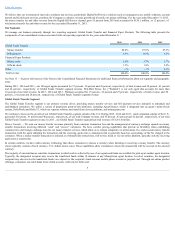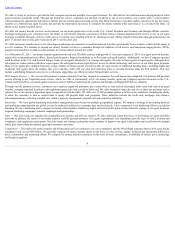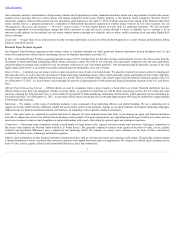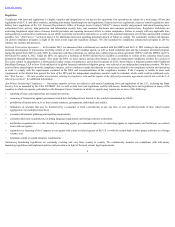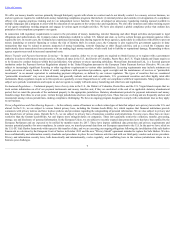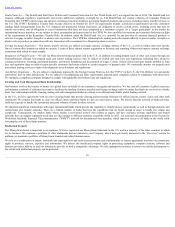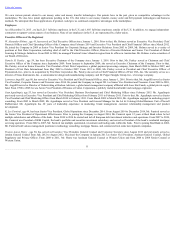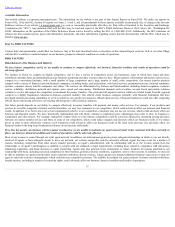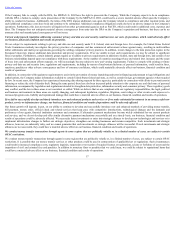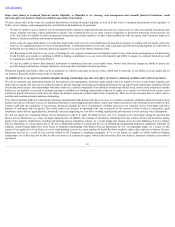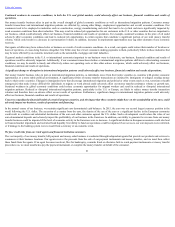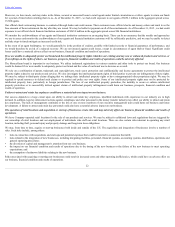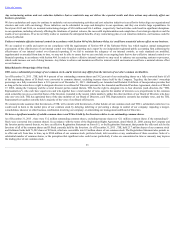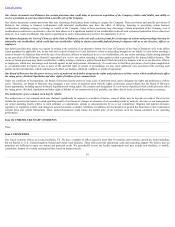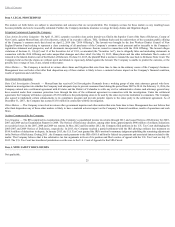MoneyGram 2015 Annual Report Download - page 16
Download and view the complete annual report
Please find page 16 of the 2015 MoneyGram annual report below. You can navigate through the pages in the report by either clicking on the pages listed below, or by using the keyword search tool below to find specific information within the annual report.
Table of Contents
We are considered a Money Services Business in the U.S. under the Bank Secrecy Act, as amended by the USA PATRIOT Act of 2001. As such, we are subject to
reporting, recordkeeping and anti-money laundering provisions in the U.S. as well as many other jurisdictions. During 2015 , there were significant regulatory
reviews and actions taken by U.S. and other regulators and law enforcement agencies against banks, Money Services Businesses and other financial institutions
related to money laundering, and the trend appears to be greater scrutiny by regulators of potential money laundering activity through financial institutions. We are
also subject to regulatory oversight and enforcement by The U.S. Department of the Treasury Financial Crimes Enforcement Network ("FinCEN"). Any
determination that we have violated the anti-money-laundering laws could have an adverse effect on our business, financial condition and results of operations.
The Dodd-Frank Act increases the regulation and oversight of the financial services industry. The Dodd-Frank Act addresses, among other things, systemic risk,
capital adequacy, deposit insurance assessments, consumer financial protection, interchange fees, derivatives, lending limits, thrift charters and changes among the
bank regulatory agencies. The Dodd-Frank Act requires enforcement by various governmental agencies, including the CFPB. Money transmitters such as the
Company are subject to direct supervision by the CFPB and are required to provide additional consumer information and disclosures, adopt error resolution
standards and adjust refund procedures for international transactions originating in the U.S. in a manner consistent with the Remittance Transfer Rule (a rule issued
by the CFPB pursuant to the Dodd-Frank Act). In addition, the CFPB may adopt other regulations governing consumer financial services, including regulations
defining unfair, deceptive, or abusive acts or practices, and new model disclosures. We could be subject to fines or other penalties if we are found to have violated
the Dodd-Frank Act’s prohibition against unfair, deceptive or abusive acts or practices. The CFPB’s authority to change regulations adopted in the past by other
regulators could increase our compliance costs and litigation exposure. Our litigation exposure may also be increased by the CFPB’s authority to limit or ban pre-
dispute arbitration clauses. We may also be liable for failure of our agents to comply with the Dodd-Frank Act. The legislation and implementation of regulations
associated with the Dodd-Frank Act have increased our costs of compliance and required changes in the way we and our agents conduct business. In addition, we
are subject to periodic examination by the CFPB. Our initial examination by the CFPB was completed in 2015. The results of this examination may require us to
change the way we conduct business or increase the costs of compliance.
We are also subject to regulations imposed by the FCPA in the U.S., the U.K. Bribery Act and similar anti-bribery laws in other jurisdictions. Because of the scope
and nature of our global operations, we experience a higher risk associated with the FCPA and similar anti-bribery laws than many other companies. We are
subject to recordkeeping and other requirements imposed upon companies related to compliance with these laws. In 2015, there have been significant regulatory
reviews and actions taken by the United States and other regulators related to anti-bribery laws, and the trend appears to be greater scrutiny on payments to, and
relationships with, foreign entities and individuals.
We are also subject to the European Union’s Payment Services Directive (“PSD”), which governs the regulatory regime for payment services in the European
Union, and similar regulatory or licensing requirements in other jurisdictions. The PSD and other international regulatory or licensing requirements may impose
potential liability on us for the conduct of our agents and the commission of third-party fraud utilizing our services. If we fail to comply with the PSD or such other
requirements, we could be subject to fines or penalties or revocation of our licenses, which could adversely impact our business, financial condition and results of
operations. Additionally, the U.S. and other countries periodically consider initiatives designed to lower costs of international remittances which, if implemented,
may adversely impact our business, financial condition and results of operations.
In addition, we are subject to escheatment laws in the United States and certain foreign jurisdictions in which we conduct business. These laws are evolving and are
frequently unclear and inconsistent among various jurisdictions, making compliance challenging. We have an ongoing program designed to comply with
escheatment laws as they apply to our business. In the United States, we are subject to the laws of various states which from time to time take inconsistent or
conflicting positions regarding the requirements to escheat property to a particular state. In some instances, we escheat items to states pursuant to statutory
requirements and then subsequently pay those items to consumers. For such amounts, we must file claims for reimbursement from the states. Furthermore, certain
foreign jurisdictions do not have escheatment provisions which apply to our transactions. In these jurisdictions where there is not a requirement to escheat, and
when, by utilizing historical data we determine that the likelihood is remote that the item will be paid out, we record a reduction to our payment service obligation
and recognize an equivalent amount as a component of fee and other revenue.
15


